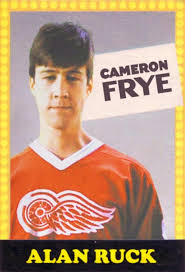Those four words have been the rallying cry for most of Clay Shirky's recent talks at TED@State and other venues recently, speaking about how the media landscape is changing at a rapid rate. In one of my previous posts I mentioned the video you can watch on the subject along with the keynote presentation I did at the Harker Teacher Institute in June. In that keynote, "Jumping the Educational Shark," a reference to the social phenomena that Skirky identifies as the "cognitive surplus" of time that people in industrialized countries had after World War II that was taken up by the "sitcom." And my own reference to the phrase "Jumping the Shark," which is common in television, when a show has peaked and is definitely beginning to slide into the abyss and is making one last effort to bring viewers back before the show is eventually cancelled.
My point in the keynote was to express the idea that the educational community has many people trying desperately to hold on to the old industrial model of education that resembles an assembly line, but not recognizing that it is no longer useful to prepare students for the world they will live in during their adult lives. One of the arguments of this group was that we couldn't assign students work to do using computers or the Internet because not all students had access to those tools. Access has been improving steadily over the past few years and now, I truly believe this argument is no longer valid. If students want a computer, they cost about as much as a cell phone and if they want to use that device to access the Internet, there is free access at at variety of locations. This came into focus for me over the past three days. First, I read that Barnes and Noble is another national business, along with Panera Bread and Starbucks that is providing free Internet access to their patrons. Secondly, all of the public libraries in San Mateo County, where I teach, provide free wifi access as well. Third, the City of East Palo Alto, where some of our neediest kids live, has a free municipal wifi program that covers most of the city, called "wifi101." (Here is a link to their coverage map.)
Along with these developments, the Pew Internet and Life Project published a new report about how people are accessing the Internet and more than half (56%) have done so using a wireless connection through a phone or wifi. Some may say that the number is low, but there are some issues that are brought to light when you dig a little deeper. The first is that the use of wifi or accessing the Internet through a 'smart phone' has been completely demystified. It is common place in our society and people can assist those who are trying to make the leap into the wireless world. Secondly, the group showing the greatest percentage of gain is African Americans.
"African Americans are the most active users of the mobile internet – and their use of it is also growing the fastest. This means the digital divide between African Americans and white Americans diminishes when mobile use is taken into account."
So, to me the divide has been bridged. If a student wants access, it is available. They might need to jump through a hoop or two, but there is access and in most instances it is free. What does this mean to education, especially in my school. The on-going rhetoric from teacher's that they cannot assign work to students that would require them to access the Internet or use some type of technology is no longer valid. To me, as an administrator, the message is clear: Teachers you need to move forward and use these tools to engage students in the educational process. A blog post that crossed past me this week says it about as good as I could ever home to. It is from the "TeachPaperless" blog and it is titled, "Top Eleven Things Teachers Need to Know About Technology."
Image: www.thumbjockey.com




